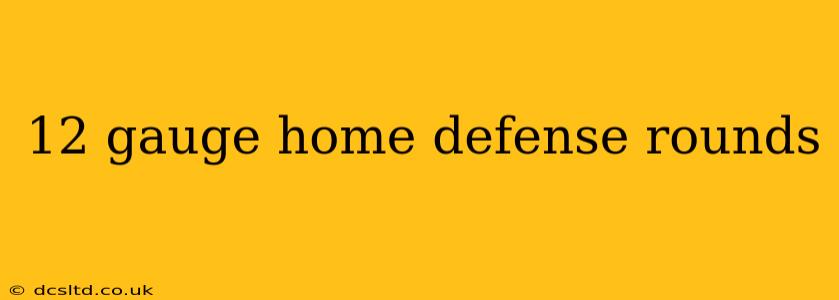Choosing the right ammunition for home defense is a critical decision, and for 12-gauge shotgun owners, the options can seem overwhelming. This guide will help you navigate the complexities of 12 gauge home defense rounds, focusing on factors like stopping power, penetration, and the potential for overpenetration – a crucial consideration for protecting both yourself and your family within the confines of your home. We'll explore various types of ammunition and help you make an informed choice.
What Makes a Good Home Defense Round?
The ideal home defense round needs to balance several key factors:
- Stopping Power: The ability to immediately incapacitate a threat. This is paramount in a home invasion scenario where rapid neutralization is essential.
- Penetration: Sufficient penetration to reliably reach and stop the threat, even through barriers like doors or walls.
- Overpenetration: Minimizing the risk of the round passing through the target and endangering innocent bystanders or neighbors. This is a significant concern in a home environment.
- Recoil: Manageable recoil is crucial, especially for less experienced shooters, allowing for rapid follow-up shots if necessary.
Types of 12 Gauge Home Defense Rounds
Several types of 12 gauge ammunition are commonly considered for home defense:
12 Gauge Buckshot
Buckshot rounds contain multiple pellets (typically 000, 00, or #1 buck), offering a wide spread and high stopping power. The larger the number (000 being larger than #1), the larger the pellets and the greater the stopping power, but also the greater the potential for overpenetration.
12 Gauge Birdshot
Birdshot, with its smaller pellets, is generally unsuitable for home defense due to its significantly lower stopping power. While offering less overpenetration, its effectiveness in stopping a threat is questionable.
12 Gauge Slugs
Slugs are single projectiles, offering the greatest penetration but also the highest risk of overpenetration. Their trajectory is straighter than buckshot, making them potentially more accurate at longer ranges, but less effective in close quarters where a wider spread might be preferable. They are generally not recommended for home defense in most situations due to overpenetration risks.
12 Gauge Reduced Recoil Rounds
These rounds are designed to lessen the felt recoil, making them more comfortable to shoot, particularly for smaller individuals or those less experienced with shotguns. However, it's essential to ensure the reduced recoil doesn't significantly compromise stopping power.
What are the best 12 Gauge Home Defense Rounds?
There is no single "best" round, as the optimal choice depends on your specific circumstances, including your home's construction, the potential threat, and your comfort level with the firearm. However, many experts recommend 00 buckshot as a reasonable compromise between stopping power and overpenetration.
What is the best 12 gauge home defense load for close range?
For close-range engagements within a home, the wider spread of 00 buckshot provides a higher likelihood of hitting the target, making it a popular choice.
What gauge shotgun is best for home defense?
While 12 gauge is a common and effective choice, other gauges like 20 gauge offer less recoil and are still capable of delivering sufficient stopping power. The best gauge for you depends on your individual needs and physical capabilities.
What ammunition is best for home defense?
Ultimately, the "best" ammunition for home defense depends heavily on individual factors. The key is to carefully consider stopping power, penetration, overpenetration risk, recoil, and your own comfort level. Consult with experienced firearms instructors and carefully test any chosen ammunition to determine its suitability for your needs. Remember, responsible firearm ownership includes thorough training and a deep understanding of your equipment and its limitations.
Disclaimer: This information is for educational purposes only and should not be considered professional advice. Always consult with a qualified firearms expert and adhere to all applicable laws and regulations regarding firearm ownership and use. Safe and responsible gun ownership is paramount.
